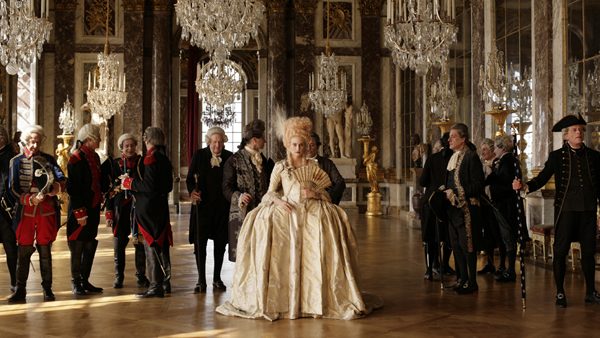
Farewell, My Queen gives us a look into the forbidden passions of one of the most infamous figures in French history.
Sometimes, the best lesbian film is not lesbian films, per se. For example, Bound, and also Black Swan, both written and directed by men and starring straight actors, but nevertheless loaded with eye candy, authentic lesbian eroticism, dramatic suspense and high-end visual effects; completely absent were the coming-out clichés and talky psychobabble found in many a low budget lesbian outing. It is from this perspective that I consider Farewell, My Queen another great, non-lesbian and yet somehow thoroughly lesbian film.
Based on the best-selling novel by Chantal Thomas, and directed by Benoît Jacquot, this French film is no less accessible for its subtitles or its period setting of July 1789. The high stakes and suspense are already built-in: this is the tumultuous prelude to the French Revolution and the foundations of modern culture as we know it.
At the helm of a ship that has lost its course is Marie-Antoinette—but not like you’ve ever seen her before.
Diane Kruger’s Marie-Antoinette is an intelligent, willful, neurotic and passionate Queen who is more turned on by good embroidery and the youthful looks of her female servant than she is by power.
The film focuses on her queerness, embodied mostly in her dependence on and enjoyment of female company, and her desperate infatuation with the Duchess Gabrielle de Polignac. This relationship, the history of which occurs before the film begins, foreshadows her fate: she has quite literally lost her head over this woman with whom she is madly in love and yet cannot seem to possess in a way that the society she reigns over would approve.
While the mutinous uprisings in Paris are on the boil the Queen’s unrequited passions simmer and she swings between diverting herself with opulence and whimsy and fretting about her future. All this is observed by Sidonie Laborde (Léa Seydoux), the Queen’s devoted, young but not-so-innocent reader who longs to please her mistress and whose own frustrated passions nicely mirror those of the Queen.
As the clock ticks down to revolution and a scurrilous list circulates demanding the beheading of 286 nobles—including the Queen—we live out the last days of Versailles, its chandelier-studded ceilings and gilt-coated walls now a prison for its panicking, aristocratic inhabitants.
If you liked Dangerous Liaisons you’ll love Farewell, My Queen. Just don’t go expecting full-on lesbian love scenes—the same-sex kisses are there, but they are chaste and few. Expect, instead, impeccable acting, a witty script, luxurious production values, and mesmerizing performances from the female leads. While not a lesbian movie, per se, the plot teases out a female love triangle of sorts, and the loyal Sidonie’s love for her Queen leads her to understand the love that dare not speak its name.
As for the dramatic suspense: well, we know how this story ends, but kudos to all involved in the film for keeping us on the edge of our seats until the last moments.




